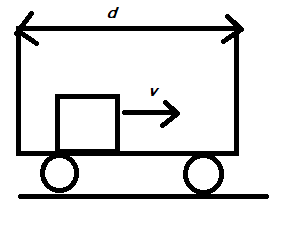Question
Question: In a smooth stationary cart of length \(d\), a small block is projected along its length with veloci...
In a smooth stationary cart of length d, a small block is projected along its length with velocity v towards front. Coefficient of restitution for each collision is e. The cart rests on a smooth ground and can move freely. The time taken by block to come to rest wrt cart is

A.(l−e)vedB.(l+e)vedC.edD.∞
Solution
To find the time when the block comes to rest, let use the given velocity and the distance. Since the velocity of the block after the collision is unknown. Let us use the given coefficient of restitution, to find the velocity after each collision.
Formula used:
e=velbeforecollisionvelaftercollision and speed=timedistance
Complete answer:
Let us assume that there is no external force acting on the block and is confined to the walls of the cart Let us also assume that the block comes to rest after n collisions with the walls of the container. Since the block is confined to the cart, then the maximum distance covered by the block is d.
Given that the velocity of the block is v and the coefficient of restitution for each collision is e. Where the coefficient of restitution is the ratio is velocity of the block after collision to velocity of the block before collision.
i.e. e=velbeforecollisionvelaftercollision
Then, we can find the velocity after 1st collision as ve
Similarly, for the velocity after n collisions is ven
Since we know that, speed=timedistance
Then, the time taken for n collisions is given by t=vd+ved+ve2d+..+vend
Or, we get t=vd[1+e1+e21+..en1]
Since the series e1 is converging, we get,
t=vd[1+∞]
We know that any number added to ∞ results in ∞.
Hence, we get t=∞
So, the correct answer is “Option D”.
Note:
Here it is assumed that the block collides with the walls of the cart at a velocity v, then it rebounds with a velocity ve. Then, the new velocity of the block is ve, again the block collides with the other wall of the cart, then it rebounds with ve2. Each time it covers a distance d.
